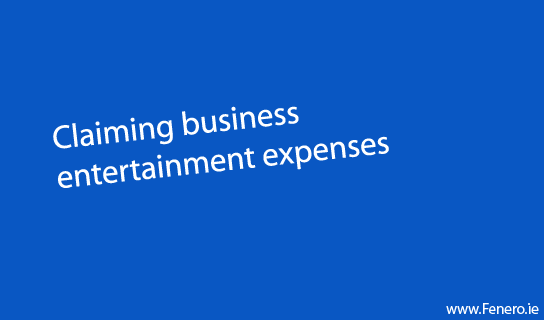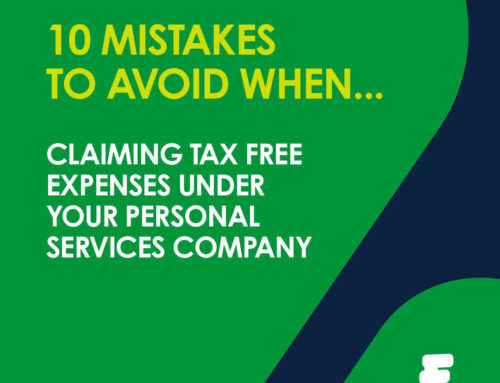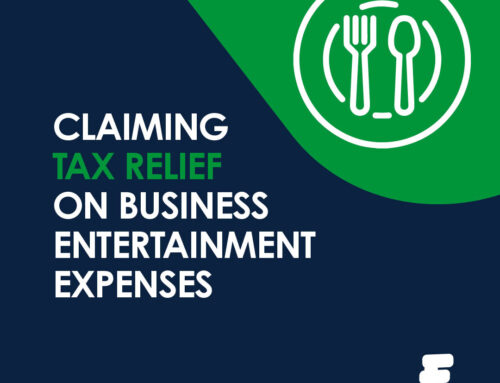We often get asked about claiming expenses for taking business associates, contacts or colleagues out for a meal or drinks. What are the rules on this when you operate a limited company?
The Essential Principle
For the avoidance of any doubt, business entertainment costs are defined as the provision of accommodation, food, drink, gifts or any other form of hospitality.
Put simply, business entertainment expenses for clients, suppliers or other business associates other than direct employees, are not expenses which are eligible for corporation tax relief. Therefore when we calculate your company profits at the end of the year, these expenses are essentially ignored in arriving at your taxable profit figure. An illustrative example may help to explain:
EXAMPLE
If your total sales for the financial year are €80,000 and your total salary and tax deductible expenses (i.e. not including any entertainment expenses) are also €80,000, then your company has a taxable profit of zero for that year and therefore has no corporation tax liability.
Assume that everything remains the same in the next financial year, except that within your total salary and expenses of €80,000 is an amount of €2,000 relating to business entertainment expenses. This €2,000 is ignored for the purposes of arriving at your taxable profit. This means that you only have a total of €78,000 in tax deductible expenses to offset against your total sales of €80,000. This gives you a taxable profit of €2,000, upon which you are taxed 12.5% corporation tax. Therefore a corporation tax liability of €250 arises on the €2,000 of entertainment expenses which have been put through the company.
If I have to pay corporation tax, does this mean I should not put entertainment expenses through my company?
Although these expenses are not eligible for corporation tax relief, your company is still entitled to reimburse you for them on a tax free basis provided that they were incurred “wholly, exclusively and necessarily” in the performance of the duties of the directorship or employment.
Therefore although your company will have a corporation tax bill, you will be making a tax saving overall due to income tax savings.
Let’s explain.
If it is a business necessity that you spend money on entertainment, then presumably you will have to spend the money one way or another. If you do not reclaim this as an expense from your company, it means that you are paying for the entertainment costs out of your own after-tax income. If the company reimburses you for the cost however, it means that you are paying for it out of your before-tax income. The savings made by paying out of your before-tax income outweigh the cost of the 12.5% corporation tax liability. Let’s crunch some numbers to prove it.
EXAMPLE
Let’s assume you are a higher rate tax payer. In 2014 this means you are paying 41% PAYE, 4% PRSI and 7% USC. This is a total of 52% on income taxes. Say that during the course of a year you need to spend €2,000 on entertainment costs for your company. If you do not reimburse yourself from your company for this, it means you are paying for this out of your after-tax income. This means you would have to earn €4,167 and pay income taxes of €2,167 to cover the €2,000 spent on entertainment costs. If instead you claim a reimbursement from your company for the €2,000, it means you are paying for this out of your before-tax income and therefore avoid the income taxes of €2,167. Instead the company pays just €250 corporation tax. A clear no-brainer when it comes to tax savings.
It is extremely important however that any business entertainment expenses that you claim back through your company must be genuine business related expenses which were incurred “wholly, exclusively and necessarily” in the performance of the duties of the directorship or employment. If you put through any entertainment expenses which do not fulfil this criteria, the company is not entitled to reimburse you for it on a tax free basis. Therefore you cannot for example take your friends out to dinner on a Saturday night and “expense” it through your company.
To avoid getting into difficulties with Revenue over the validity of business entertainment expenses, we highly recommend that you keep a record of whom you were entertaining and the business purpose behind this. Any backup emails or other records that you have to support the business need for this entertainment cost should be retained as part of your company financial records.
Exceptions to the Rule
The only type of entertainment expense which is eligible for corporation tax relief is staff entertainment expenses such as a staff Christmas party. These are fully tax deductible (i.e. the company will not have a corporation tax liability arising from them) on the condition that the events are all inclusive for all staff to attend and the expenses are of a reasonable amount.
It is important to note that staff entertainment expenses refers to direct employees of your company. Many contractor companies do not have additional employees other than themselves and therefore will not have staff entertainment expenses. If you are a contractor, do not confuse “staff” as fellow colleagues working for your client company.







